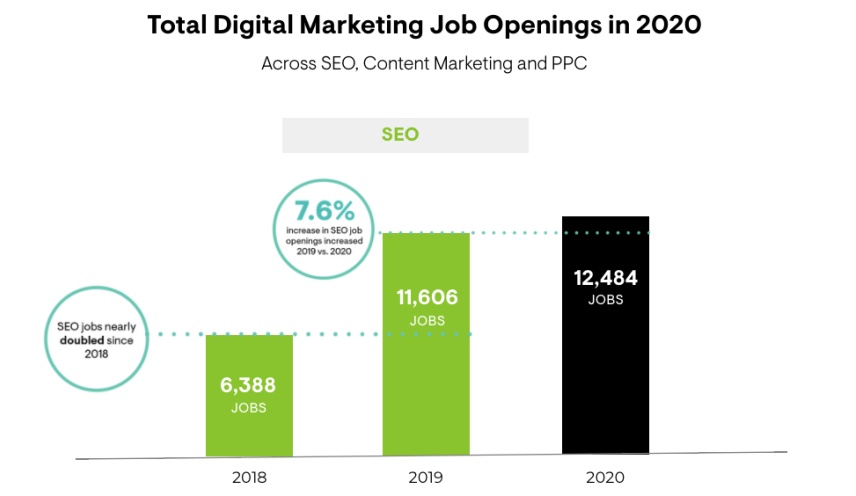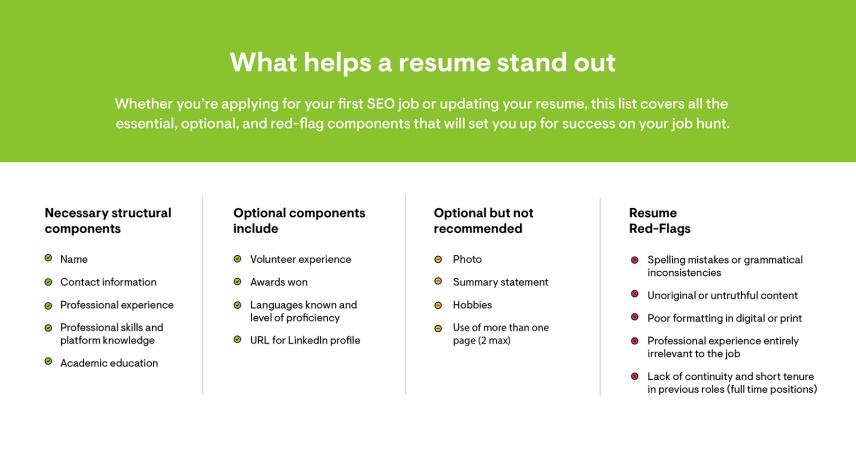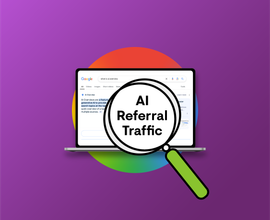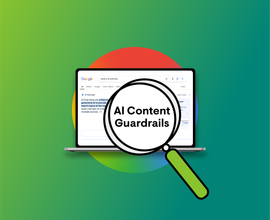How To Write A Standout SEO Resume (With Examples)
Thinking of getting into SEO or advancing in the field? These tips and examples will help promote your skills and get your SEO resume noticed.
The type of SEO work you’ll embark on depends on the type of industry you work in. You might find an opportunity:
- In-house.
- With an agency.
- At an SEO SaaS company.
- As an Independent or Freelance Consultant.
Whatever your aspirations, you need a professional and high-quality SEO resume to set you apart.
Our industry continues to see substantial growth year after year, and an increasing number of companies nationwide are recognizing the significance of SEO on their marketing initiatives.
This is evident by a rising reliance on in-house and external efforts to drive organic traffic.
And if you’re looking for a career in SEO, that’s great news for you.
In this article, you’ll learn about the current state of the U.S. SEO job market, different types of roles, what employers are looking for in winning candidates, and how to craft a resume that will stand out.
What Does The SEO Job Market Look Like Going Into 2022?
As companies’ SEO needs grow, so do the number of available SEO positions, the diversity of those positions, and the range of industries hiring SEO professionals.

And as your experience grows, so too will your salary, making SEO an appealing career choice to invest in.

To keep track of this evolving industry and guide you towards the right SEO job, we’ve created this SEO job market overview.
Let’s start with…
Who Hires SEO Professionals?
In-House SEO
One of the biggest benefits of being an in-house SEO expert is having access to its first-party research and data.
Plus, you are privy to the company’s marketing objectives and previous efforts, which puts you in a strong position to kick off your work.
Seek out companies with dedicated SEO teams or individuals. The number of SEOs in a company will give you a sense of its current investment in the field.
Joining an existing team may also aid your transition into the company and clarify opportunities for growth.
That being said, now’s a great time to advocate for a new SEO role or team.
Organic has proven itself the lifeblood of company web traffic and remains reliable even in uncertain times.
Consider pitching a new SEO role within your current company by proving the organic’s value to a CMO skeptical of bringing SEO in-house.
Or during an interview, suggest it as a role you could eventually step into given your SEO skill set.
Agency SEO
At agencies, SEO roles would all be client-facing.
You’d be supporting the SEO needs of other companies.
Difficulties include potentially not having access to first-party data, clarity into the client’s marketing objectives, or being able to directly implement the changes that will have the greatest impact.
However, the benefits include exposure to multiple clients across a variety of industries, platforms, data sources, and SEO challenges.
These will provide you with a wealth of experience that expands your skills and makes you a highly appealing job applicant.
SEO SaaS (Software As A Service) Company
You can’t get much more SEO than working for a company dedicated to the industry.
And there are many options.
Similar to at an agency, your role could be client-facing, using your mastery of your SaaS platform to support their needs.
This type of role could eventually lead you to oversee the strategic direction of client relationships.
Outside of SEO teams, there is a range of departments that include SEO-dedicated roles:
- Sales: Promoting the benefits of SEO to prospective customers.
- Account Management: Helping clients establish their SEO goals. and strategic needs through the productive use of your company’s platform or service.
- Marketing: SEOing the company itself to promote its values, emphasize its SEO expertise, and organically promote its offerings.
Independent Or Freelance Consultant
Freelancing can provide you with more flexibility around title, salary, and hours.
It doesn’t commit you to any particular company but by developing strong relationships with in-house teams, you may be able to establish a roster of regular roles.
This type of position would allow you to be highly independent but it also leaves you at the whim of your temporary employer.
There may be limited guidance and access to first-party data, both of which you should determine in advance to set expectations.
What Types Of SEO Jobs Are Currently Available?
Once you’ve investigated the industries that hire SEOs, you can look for the following positions:
In-house Or Agency
- SEO Analyst
- SEO Specialist
- SEO Senior Analyst
- SEO Manager
- SEO Senior Manager
- SEO Director
You may also find that you’re qualified for roles with similar titles in marketing, analytics, content, or dev departments that have an SEO component.
But carefully read each job description to ensure that your expectations align with those of the company you’re applying to.
SEO SaaS Company
- SEO Performance Analyst
- SEO Success Manager
- SEO Success Senior Manager
- Customer Support Manager
- SEO Customer Success director
- VP SEO Customer Success
You can also look for roles within Account Management, Sales, or Marketing.
Looking at the Career sections of these companies or at employee LinkedIn profiles will help you understand the job titles for each department.
Consultant/Freelancer
Freelancing or consulting as an SEO may give you the freedom to choose your own job adventure, including picking your own title.
But this isn’t always the case.
Freelancing at an agency, for example, may require you to accept an assigned title based on the way an SOW was written that included your position.
However, you can decide how you want to present yourself on your resume.
You could ignore specific titles and focus on a title related to your consultancy expertise.
In that case, ensure that your accomplishments accurately reflect the level of effort, managerial responsibilities, and budgets as a means of expressing the scope of your experience.
What Are SEO Employers Looking For?
The most critical part of any resume is your experience.
But building a noteworthy and eye-catching record of your accomplishments that will help the reader envision you at their company is a challenging feat.
Not only does each job need to demonstrate the impact of your work but you want to show growth from one to the next.
Ensure that you layer SEO within as many line items as possible.
For a larger scale marketing effort or campaign, tie in SEO to highlight your individual contribution to the team.
When writing a description of professional achievements, keep these sentence structures in mind:
- [Active success verb] + [KPI improvement] due to [project/SEO initiative]
- [Active action verb] + [project/SEO initiative] + which resulted in [KPI or output improvement]
For example:
- Grew organic traffic by +25% after establishing monthly optimization plans to update content based on keyword analysis reflective of ever-changing user intent.
- Improved site load speed after reducing site technical errors by 20%. Prioritized broken issues such as links, redirect, and images which lead to lag and hurt the user experience.
- Created the team’s first SEO strategy that outlined all SEO plans and objectives for the year and established a cross-team collaborative workflow.
The goal is to prove how your actions, either independently or as part of a team, contributed to SEO business objectives.
Skills
Three key SEO skill areas that hiring managers are always looking for are Content Writing, Technical, and Data Analytics.
Content Writing
Writing and language are at the heart of SEO since the goal is to match user intent, via language used in searches, to the content you have on your site.
It’s a form of Q&A. Valuable applicants can show how they conduct keywordKeyword
A keyword is what users write into a search engine when they want to find something specific.
Learn more research, interpret it, and directly apply findings to writing content.
The same goes for knowing all of the written components that make content more likely to rank well on Google, such as Title Tag, Meta DescriptionMeta Description
The meta description is one of a web page’s meta tags. With this meta information, webmasters can briefly sketch out the content and quality of a web page.
Learn more, and Alt Tags.
Preparing these yourself using keyword research prior to content publication, shows you can save your team’s time and energy by getting SEO-ed content live faster.
Technical
The majority of technical SEO expectations don’t require direct web design, web development, or programming experience, though you should highlight any related capabilities you have.
These can be highly beneficial to an SEO career and are skill sets you should invest in if you want to advance your technical capabilities .
Key technical SEO support includes understanding and optimizing the backend components of a site that help get it ranked and improve rank.
You’ll be expected to run site crawls to identify what helps your pages (ex: inclusion of meta tags) and what hurts it (ex: slow page speed, broken links).
You may be asked to launch a new site or support a site migration, which has many technical implications.
Depending on the company, you may be able to update the website yourself or request changes be made.
Asking for clarification about this in advance will help you determine your workload.
Data Analytics And Reporting
Knowing how to compile, organize, and analyze data is especially relevant for SEO roles.
What’s even more valuable is knowing how to derive insights from data and use it to tell a story. To do this, make Excel your best friend if you haven’t already.
Learn how to do vlookups, concatenates, IF statements, and pivot tables.
Once you do, you won’t know how you ever survived without them.
Using SEO data, you can tell the story of the full organic traffic funnel, from content appearing on Search Engine Results Page (SERP), to clicks through to the site based on specific queries, to site organic pageviews, and on to eventual conversions.
To do this, you’ll need to be familiar with site analytics platforms, Google’s Search Console , and whatever ways your company tracks conversions.
Mapping out this funnel will support optimization creation and aid you in obtaining buy-in for your efforts.
If you don’t have experience with these platforms, there are online courses and training available.
But also consider requesting access to these platforms at your current job, even if you don’t use them in your day-to-day, to practice with.
Proving expertise in at least one of these SEO-related skills and knowledge of the other two will help you stand out for SEO roles.
Outside of these, a hiring manager may look for the following items in your resume, especially for more experienced candidates:
Insights And Optimizations
Optimization is the literal name of the game.
Ensure that as you write out your professional accomplishments, you reference the insights you’ve uncovered, the optimizations that were implemented, and their impact.
Interpersonal Skills
Being able to present yourself well, communicate clearly, and concisely explain the critical thinking behind your SEO practices will make you appear not only confident but reliant and trustworthy.
Think about how to express these efficiently in the way you write your accomplishments and plan ahead for how you can let these qualities shine in an interview.
Diversity In Your Customer, Client, And Brand Base
Having a well-rounded background of industry knowledge will help showcase your value.
Especially when working with customers, experience and familiarity with different fields make you a very appealing job prospect.
It lets you jump right into various client worlds’ and make yourself invaluable to them.
SEO Tools
To emphasize your skills and range of day-to-day abilities, call out the tools you’ve used and mastered.
Start by creating a Skills section in your resume and listing out the SEO tools you’ve had experience with.
You don’t need to include specific tools under Experience.
Use that section to focus on taking credit for initiatives and results.
But if you incorporate language relevant to the processes and capabilities of the platforms and tools, those reading your resume who are familiar with the tools will understand their supportive role.
Tools fall into two different sets, both of which are important to include.
First, there are the paid tools and those that connect directly to a website that companies and clients give you access to.
For example:
- Google Analytics or Adobe Analytics for tracking site activity.
- Google Search Console or Bing Webmaster Tools for understanding a site’s presence on Google.
- Conductor as paid SEO platforms with custom access to site data.
Usage and application of at least one of each of these will be looked for by potential employers.
This isn’t just to check off requirements but to understand the ways you’ve been exposed to SEO and get a sense of how you work.
Experience with tools will almost certainly be asked about in an interview so be prepared to address platform use cases and outcomes from your resume.
For team efforts, focus on your individual role with the tool and collaboration with other team members.
Second, there are a plethora of free SEO resources that a skilled SEO professional should have at their fingertips.
These not only help you with your craft but also look great on a resume. A few include:
- Programs: Screaming Frog.
- Page analysis plug-ins: Conductor, MozBar, SEO Minion.
- SERP additions: Keywords Everywhere.
These aren’t required but a knowledgeable SEO hiring manager will look for these tools to indicate that you’re leveraging SEO skills and applying SEO capabilities on a regular basis.
SEO Resume Tips For Those New To The Field
Early in your career and especially for your first job, it’s fine to only have experience with one of the three key SEO skills.
For example, if you wrote for a college publication, had a marketing or analytics internship, or worked on a personal dev project, lean into it and focus on the tactical capabilities you’ve learned.
Mention the range of projects, skills, tools, research, and clients you were exposed to.
As you try to join the field of SEO or are entry-level looking to move up, leverage the range of online resources for getting started with SEO.
This thorough guide consolidates 37 basic SEO tips into one hub.
If you’re not sure where to start, focus on the top SEO skills recommended by those in the industry, especially the tips for beginners.
Most will tell you to learn and reinforce knowledge of the skills and tools listed above.
In addition, work on the following SEO project journey to understand its individual components and how they connect together.
Leverage data to uncover searches driving current trends, whether those searches show your page, and if what shows up encourages people to click through.
Use that data to find content gaps with high enough search volume to warrant the creation of new content or edits to existing content.
Look to understand the basics of HTML, CSS, and Javascript, particularly, what are the components that can be read by Google and help the site get ranked.
Based on what Google can read, it then decides whether that content is relevant to a specific keyword.
So know when to apply your writing skills or when to collaborate with writers to incorporate the best language that answers users’ searches in the on-page and coded site components.
Those Applying To More Experienced SEO Roles
If you’re already got a few years of experience, focus on further strengthening your SEO resume in the following ways:
Highlight how your experience and tactical capabilities in the three key SEO skills have evolved, especially in your more recent roles.
Demonstrate development for each and take credit for your role in project conception, execution, and results.
Apply a similar process to strategic growth.
Go beyond a one-off project.
Present your role in influencing a shift in a business practice via large-scale impact and long-lasting value.
For example: Explain how you trained and obtained buy-in from a team of content writers, who were previously unfamiliar with SEO and keyword research.
Then show how your efforts both halted unnecessary errors and set content up for success from the moment it’s published.
Include any managerial experience, the number of direct reports and trainings hosted to show impact and recognition.
What Helps An SEO Resume Stand Out
Whether you’re applying for your first SEO job or looking to improve or refresh your SEO resume, the list below covers all the essential, optional, and red-flag components that will set you up for success on your job hunt.

Necessary Structural Components
- Name
- Contact information
- Professional experience
- Professional skills and platform knowledge
- Academic education
While these may seem like obvious inclusions, there are a few things to note.
Contact Information
A full address used to be commonplace on resumes but it’s no longer required since email is the primary method of communication.
If it’s needed by employers, they’ll request it in the application process.
Professional Experience And Skills
While details about these sections are included above, it’s critical that the information you include is accurate to you and your experience and relevant to the job description.
Determine if it’s worthwhile sending out different versions of your resume to different companies based on the job descriptions.
The time that will take should be well worth the effort.
Education
The placement of this section should depend on the level of professional experience you’ve had.
Keep it at the top of your resume, under contact information, if you’re a recent grad or haven’t yet had a job with skills relevant to SEO.
Once your professional experience becomes relevant to the work you’re applying to, move Education below it.
Direct experience is what recruiters and hiring managers will want to see first.
For each institution attended, including the school’s name, major/area of study, years attended, and degree/s awarded.
If no degree was awarded, summarize what was studied but do not include the degree name or level.
Include any non-degree SEO, writing, marketing, design, UX, dev/tech, or analytics courses that trained and tested you in platform usage and/or awarded marketing certifications.
Add them to Skills or Experience if you took a course while employed to distinguish them from degree-based education.
Optional Components Include
- Volunteer experience
- Awards won
- Languages known and level of proficiency
- URL for a LinkedIn profile
Overall: Including these should come down to relevancy.
If awards represent the quality of work, if volunteer experience represents the quality of character, and if languages show skill of value, include them.
But if they take up too much space or seem frivolous, limit or remove them.
LinkedIn Profile Link
This isn’t required as your resume should be the full depiction of your work.
But sharing it might have other benefits.
You may have overlapping connections with company employees or their connections.
Or you may have posted SEO or marketing content that shows you’ve got a finger of the pulse of the industry.
If you include it, personalize your profile’s URL so that it’s short and clearly contains your name.
For example:
- www.linkedin.com/in/firstnamelastname
- www.linkedin.com/in/firstnamemiddleinitiallastname
Optional, But Not Recommended
- Photo
- Summary statement
- Hobbies
- Use of more than one page (no more than two)
- URLs for social media profiles
Overall: Don’t include fluff or irrelevant content that will needlessly elongate your resume and take focus from your experience.
Expect resume readers will only look at the first page so keep your relevant experience there.
Remove any of the above if they push experience off the first page.
If you absolutely must have two pages, put skills, education, volunteerism, and/or awards on page two.
Use a summary statement if you have something to add that isn’t obvious elsewhere in your resume.
But most people applying for the same job would likely want to call out similar qualities and qualifications so a statement may do little to differentiate you from other candidates.
Components That Will Negatively Impact Your Resume
- Spelling mistakes or grammatical inconsistencies
- Unoriginal or untruthful content
- Poor formatting in digital or printed versions
- Professional experience entirely irrelevant to the job
- Lack of continuity and short tenure in previous roles (for full-time positions)
Common red flags include:
Mistakes And Unoriginal Content
Assume that any company you apply to has resume-reading software that may call out mistakes or scan for plagiarism and remove you from the running.
Formatting
Using fonts that are too small and margins that are too narrow may look visually unappealing and suggest that you have trouble editing down your work.
Tiny margins may also prevent your resume from printing out properly.
Irrelevant Job Experience
Don’t waste the reader’s time by going into irrelevant detail about past roles.
If you must include a role to indicate a gap in time, then limit it to your title, employer, and dates.
Oldest Job Experience
If you’ve been in the industry for more than two or three jobs, scaling back on details from your first job/s or internships.
Lack Of Continuity And Short Tenure
While two years is no longer the job tenure standard, staying for less than a year across multiple jobs may make you seem unworthy of the investment a company plans to make in its new hires.
While there are good reasons for a short job tenure (bad fit, layoffs, better opportunities, etc…), you become less appealing if this is a clear trend in your work history.
SEO Resume Examples
Here are two examples of SEO resumes to use for inspiration. They incorporate titles, experience, achievements, skills, and styles that help SEO resumes get noticed.
You can also see how the formatting guidelines and correct balance of components mentioned above are represented on paper.
If you choose to emulate them, be sure to change and personalize them as much as possible.
- Example 1: Resume for Applying to SEO Success Manager Position
- Example 2: Resume for Applying to SEO Analyst or Senior Analyst Position
Conclusion
There’s no question—writing a great resume takes serious work.
It’s incredibly challenging to condense your entire professional and educational life into such a limited space.
Then needing to refine and condense even further with each new position you attain.
For SEO experts, this can be even more of a feat since the SEO industry has only recently been recognized as a full-time job and not just a skill.
But by following these recommendations, connecting with others in the field, practicing explaining your role and accomplishments with non-SEOs, and pushing yourself to expand your SEO knowledge, you’ll find that writing and talking about SEO becomes more natural.
And most importantly, just be your organic self.
This article was originally published by Search EngineSearch Engine
A search engine is a website through which users can search internet content.
Learn more Journal on 2/3/22.







